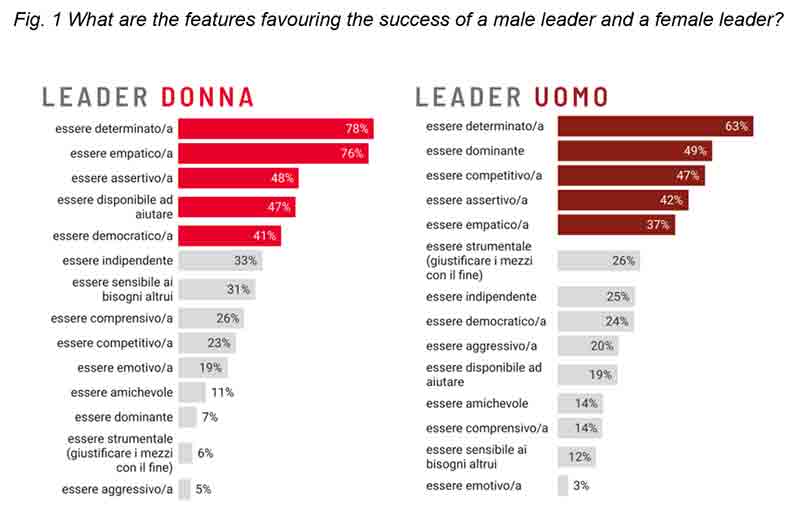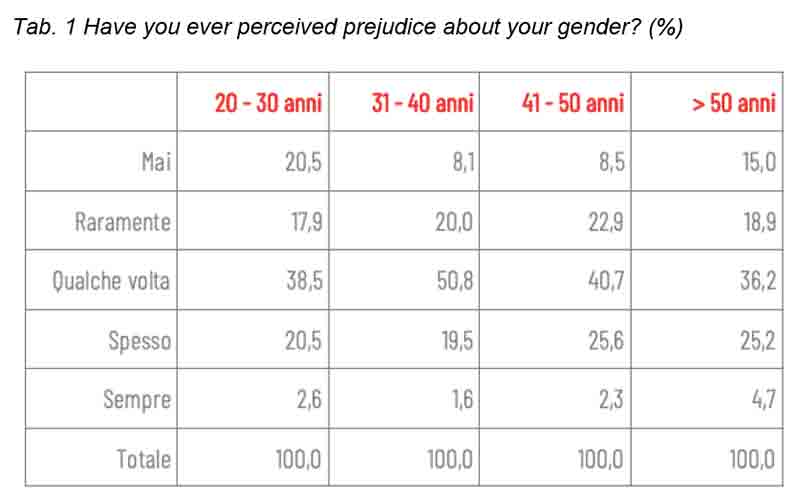The research involved 609 managers and entrepreneurs from all over the country. It was coordinated by professors Barbara Barabaschi and Paolo Rizzi of the Faculty of Economics and Law of Piacenza and carried out with the collaboration of People 3.0, a cooperative from Modena specialized in corporate wellbeing and happiness in the workplace. It was created with the aim of analysing factors, talents and conditions that favor women career within companies, as well as understanding if the leadership style of women managers and entrepreneurs differs from that of their male colleagues. Particular attention is paid to the opportunities and criticalities experienced by women who rank at the top of the corporate hierarchy. Finally, the survey adopts a multidisciplinary approach that makes it original in the academic landscape, often characterized by mono-sectoral studies.
What emerges from this research in summary is that the female leadership style tends to be aligned with the inclusive approach of coaching, based on empathy and listening to others aimed at developing relationships of quality. The orientation towards flexibility and continuous personal (even before organizational) improvement emerges. Other relevant findings concern a new kind of leadership, persistent stereotypes and the problem of work-life balance.
A new kind of leadership
The perception that women managers and entrepreneurs aged between 20 and 60 have of their role, even with respect to their male colleagues, returns a very determined leader figure but more capable of listening, supporting and training collaborators than male colleagues, because interested both in results and in the well-being of the people they work with. More capable of teaming up, a talent that proved to be essential during the pandemic, but still with the perception of prejudices, salary gaps and having trouble to balance work and personal life.
The Covid19 experience, in particular, has brought out a new leadership style that is quickly taking place, the caring leadership. This model requires the leader takes care of his collaborators as people according to the assumption that only through attention to the quality of the relationship, trust and the real enhancement of their uniqueness, the collaborators not only become loyal, but they become more resilient, proactive. During the pandemic, the ability to listen, to support, to train one's team have proved to be key success factors: the research data highlights a propensity of the interviewees to develop this style of direction and coordination.
In fact, over 50% of the interviewees under 30 and over 40% in the 30-50 range recognize themselves in the manager-coach model. In Italian companies this managerial style is still not widespread, but it is growing and the pandemic has accelerated the times of adoption.
From the answers to the question "What are the features favouring the success of a male leader and a female leader?". It is possible to observe another interesting gender difference. In particular, if on the one hand determination and assertiveness are indicated as important for both, for women they are indicated as relevant empathy, availability, democratic attitude, while in relation to men competition and dominance are indicated more frequently.

Persistent stereotypes
A change that should lead to unhinging some cornerstones of gender discrimination that even managers and entrepreneurs have faced and continue to face on a daily basis. At the root of the problem is the general belief that men are naturally led to leadership roles while women must demonstrate that they deserve them. A distortion of reality that often unknowingly affects even women themselves, as emerged during focus groups with some managers and entrepreneurs and that has concrete effects on many aspects of working life. For example, 35% of the sample has not negotiated a pay changeover for over three years, while 62% have not done so for over a year. The reason that emerges from the interviews is that, in most cases, women feel they should do it only after having demonstrated their worth and skills while men tend to negotiate in advance, accepting a proposed assignment even before having measured themselves with the ability to cover it adequately. This consideration explains why 80.8% of interviewees declare that they have met widely overrated male leaders and managers.

In this sense, the data on gender prejudice is also relevant: over 70% of women aged between 30 and 40 felt hindered in their professional career by a prejudice linked to their gender and one in 4 managers over 40 even reports having perceived this problem very often. In this regard, the age of the interviewees is relevant. In particular (as evident from the table presented above) the perception of discrimination increases with increasing age, that is, when awareness of the different forms of discrimination grows and the work-life balance presents itself as a relevant issue. This, together with a progressive improvement in gender equality, explains the fact that 20% of under 30s declared that they never felt discriminated against for reasons related to their sex.
The problem of the work-life balance
The balance between work and private life is often affected by the situation. Work contexts based on the culture of presence in the workplace, considered as a sign of dedication to the company and a prerequisite for career changes, tends to penalize women engaged in care tasks within the family (a responsibility that is increasingly shared with partners, but above all in Italy still strongly balanced on female workers).
62% of managers spend between 40 and 50 or more hours a week at work, with a total average of 48 hours; overall, 63% of the interviewees work 20% more hours than male colleagues and this creates inevitable difficulties on the personal and family front. Not surprisingly, the perception of discrimination is more widespread among women over 30 than younger women, not yet struggling with the work-life balance. Another confirmation that the work-life balance represents a critical node in the life of female managers and entrepreneurs (but not only) is evident when asked about the useful actions to overcome the problems encountered by working women, they recognize a clear priority for the development of "Career paths that do not penalize motherhood, laws and funding that favor work-life balance and the choice of institutional arrangements that promote gender equality, finally organizational contexts less centered on physical presence in the workplace". In this sense, solutions such as remote working versus smart working, proposed in the blended form, i.e. the possibility of working from home a few days a week, is considered a functional option to improve the quality of working and personal life, without penalizing the productivity, as the experience of the recent pandemic has shown.
Particular attention devoted by women managers to others also emerges from their responses to the question “Which kind of investments do you consider as a priority?” In this case they list the following: continuous training that is considered as an element of value for the growth of the person, but also to allow everyone to be valued and to give the best in his role. Two closely related factors follow: meritocracy and growth opportunities. The theme of meritocracy is always very much felt and in recent months it has certainly returned to the fore precisely because smart working is based on organization by objectives. Meritocracy means recognizing the contribution of everyone in relation to their skills, abilities, talents and commitment, it means offering opportunities to grow.
They also follow the theme of attention to the employee through welfare and flexible services.
These results are also in line with what emerged from the "Good days at work" research carried out by People 3.0 at the end of 2018 on a sample of 600 interviewees: happiness at work is obtained when we feel we have done something significant for ourselves or for others, while economic rewards take a back seat. The existence of this question absolutely confirms that fact.
Finally, when asked about the advice they would give to young men and young women they recommend, for both genders, developing awareness of the importance of investing in employees and networking inside and outside the organization.
In summary, far from wanting to be exhaustive, the research represents a first step in analyzing the evolution of the role of leader and the challenges that women aspiring to top positions still have to face. The new generations are pressing for flat hierarchies and open relationships with managers capable of enhancing talents and promoting the development of collaborators, at the same time, the needs defined by the management of teams in Smart Working have highlighted how, alongside technical skills (assigned objectives and use of Agile work) the ability to listen, to create closeness and to keep the sense of team alive even at a distance, is increasingly important. On this basis, we are convinced, new opportunities are opening up for female leadership but also for all those men who recognize working for people as a priority and not just with people ".



